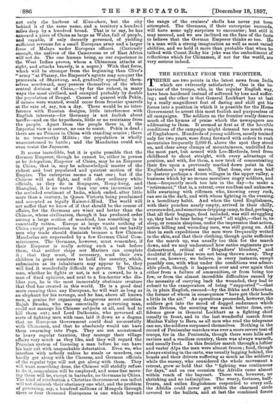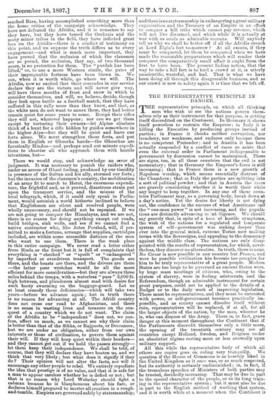THE RETREAT FROM THE FRONTIER. T HERE are two points in
the latest news from India which are extremely satisfactory. One is the be- haviour of the troops, who, in the regular English way, have been hardened instead of softened by loss and suffer- ing; and the other is that General Lockhart has at last by a really magnificent feat of daring and skill got his forces into a position in which it is possible for the Home Government to arrest this most foolish and purposeless of all campaigns. The soldiers on the frontier really deserve much of the hymns of praise which the newspapers are addressing to them. It seemed at first as if the horrible conditions of the campaign might demand too much even of Englishmen. Hundreds of young soldiers, mostly trained only for two years, were flung forward with orders to rush mountains frequently 2,000 ft. above the spot they stood on, and clear away clumps of mountaineers, undrilled for the most part, but armed with Lee-Metfords, bred from childhood to shoot straight, with every advantage of position, and with, for them, a new trick of concentrating their fire upon a previously marked down point in the Englishmen's upward march. That done, our men had to destroy perhaps a dozen villages in the upper valley, a business which by no means moralises angry soldiers, and then—frequently much too late in the day—to make a "retirement," that is, a retreat, over roadless and unknown hills swarming with riflemen who, knowing every rock, can see in the dark, and with whom fighting in the evening. is a hereditary habit. And when the tired Englishmen, with their pouches nearly empty, arrived in their chilly, overcrowded, and sometimes dripping camp, to find, perhaps, that all their baggage, food included, was still struggling up, they had to bear being " sniped " all night,—that is, to, sleep, or remain sleepless, under the impression that action, action killing and wounding men, was still going on. Add that in such expeditions the men were frequently wetted to the skin, and that their clothing, though quite sufficient for the march up, was usually too thin for the march down, and we may understand how entire regiments grew disheartened, critical of "Brigadiers' blunders," and doubtful if their lives were not being thrown away. They went on, however, we believe, in every instance, except possibly one, with what under the conditions was admir- able pluck, though it happened over and over again that either from a failure of ammunition, or from being too few, or from the almost incredible difficulties caused by the necessity of carrying back the wounded, they had to submit to the exasperation of being "supported "—that is, in plain English, rescued—by the Sikhs and Ghoorkas, the former of whom in consequence "have got their heads a little in the air." As operations proceeded, however, the soldiers got into the mood of dogged endurance which suits Britons, the scouting was much better done, con- fidence grew in General Lockhart as a fighting chief usually in front, and in the last wonderful march from Maidan Valley to Bara, as all men who read the telegrams can see, the soldiers surpassed themselves. Nothing in the record of Peninsular marches was ever a more severe test of troops, for in the Peninsula, though there were hills and ravines and a roadless country, there was always warmth, and usually food. In this frontier march through a loftier and vaster Alps the men were almost frozen ; food, though always existing in the carts, was usually lagging behind, the beasts and their drivers suffering as much as the soldiers ; while the enemy, who considered the whole movement a retreat, grew so bold that the "fighting was continuous for days," and on one occasion the Afridis came almost within reach of the bayonet. There was, however, no shrinking and no indiscipline. The weary, footsore, half- frozen, and sullen Englishmen responded to every call, the Afridis could never get within the charmed circle covered by the bullets, and at last the combined forces reached Bara, having accomplished something more than the home critics of the campaign acknowledge. They have not defeated the Afridis, and it is nonsense to say they have, but they have tamed the Orokzais and the many minor tribes in the field, they have inflicted great loss on the Afridis—there is a conflict of testimony on this point, and we suppose the truth differs as to every engagement—and what is much more important, they have proved that the seclusion of which the clansmen are so proud, the seclusion, they say, of two thousand years, is no protection for them. The "purdah has been lifted," or, to use a more Western simile, the gates of their impregnable fortress have been blown in. We can, when it is worth while, go where we will. The Afridis, now so excited that their comrades in our service declare they are the victors and will never give way, will have three months of frost and snow in which to consider themselves, and will, we believe, decide, though they look upon battle as a football match, that they have suffered in this rally more than they knew, and that, as the white men do not want to annex them they had better remain quiet for some years to come. Resign their rifles they will not, whatever happens ; nor can we get them except by torturing their owners—let Alpine climbers think of a hunt for a rifle hidden by guides somewhere in the higher Alps—but they will be quiet and leave our forts alone. We must strengthen those forts, and put them in English or Ghoorka hands—the Ghoorkas are fanatically Hindoo—and perhaps send out minute expedi- tions to chastise all who approach them with hostile intentions, but— There we would stop, and acknowledge an error of judgment. It was necessary to punish the raiders who, under an access of Ghazi feeling, produced by our timidity in presence of the Sultan and his ally, stormed our forts ; but the invasion of the clansmen's country, the mobilisation of an army fit to march to Herat, the enormous expendi- ture, the frightful and, as it proved, disastrous strain put upon the transport service, and the misuse of the local telegraph, which, if it could only speak in Parlia- ment, would astonish a world hitherto inclined to believe that Englishmen are silent and resolved people, were wholly unnecessary, and should not be repeated. If we are not going to conquer the Himalayas, and we are not, there is no reason for doing anything except cut roads, build bridges, sink wells, and see if we cannot find a native contractor who, like J otee Perslatul, will, if per- mitted to make a fortune, arrange that supplies cartridges included, are within some accessible distance Of the men who want to use them. There is the weak place in this entire campaign. We never read a letter either from Simla or the front but it is full of complaints that everything is " checked " or " spoilt " or " endangered " by imperfect or overdriven transport. The goods are there, and the beasts are there, and the drivers are there —the latter poor wretches would be all the more efficient for more consideration—but they are always three miles behind the troops with a waterless " pass " 2,000 ft. high between, and plunderers almost mad with desire for such booty swarming on the baggage-guard. Let us at least remedy these deficiencies—which will take two years—before we advance again • but in truth there is no reason for advancing at all The Afridi country does not cross our road to Afghanistan, and there is no sense in wasting lives and treasure on the con- quest of a country which we do not want. The claim of the Afridis to be " independent " does not, we con- fess, affect us much, as we cannot see why their claim is better than that of the Sikhs, or Rajpoots, or Deccanees , but we are under no obligation, either from our own interests or those of civilisation, to govern them against their will. If they will keep quiet within their borders— and they cannot get out if we hold the passes strongly— let them keep their independence. We shall be told, of course, that they will declare they have beaten us, and we think that very likely ; but what does it signify if they do ? Their opinion will not alter the facts, nor will it encourage any other people to rebel. We entirely repudiate the idea that prestige is of no value, and that it is safe for a man to appear careless whether he is defied or not ; but that is no reason why Lord Wolseley should fight a cabman because he is blasphemous about his fare, or declares himself prepared to master all creation in a rough- and-tumble. Empires are governed safely by statesmanship; and there isno statesmanship in endangering a great military organisation and the Treasury of an Empire in an effort to conquer a hill tribe which cannot pay revenue, which will not live disarmed, and which while it is actually at war with us sends us admirable recruits. Will anybody tell us why we shall be better off if all the Afridis crouch at Lord Elgin's feet to-morrow ? At all events, if they must be conquered, let them be conquered when we have made the reasonable preparations which will render their conquest the comparatively small affair it ought from the first to have been. The present Indian notion, that the way to take a hill fort is to hurl a crowd at it, is utterly unscientific, wasteful, and bad. That is what we have been doing all through this disagreeable business, and as our crowd is now in safety again it is time that we left off.







































 Previous page
Previous page